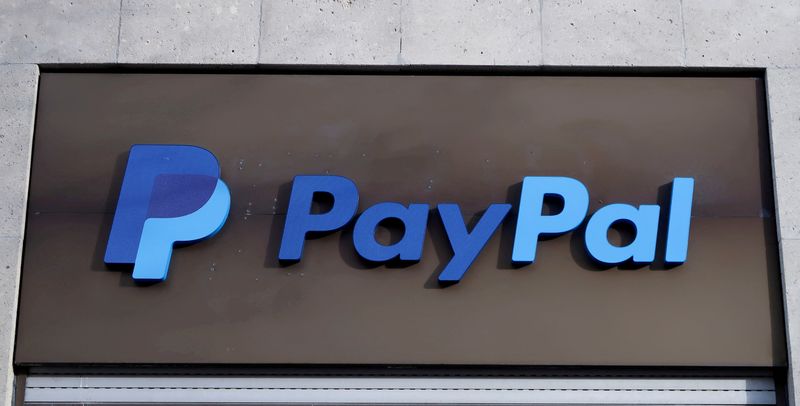By Hannah Lang
WASHINGTON (Reuters) - PayPal (NASDAQ:PYPL)'s stablecoin is likely to succeed where Facebook's failed, thanks to the payment giant's standing in Washington and policymakers' greater understanding of the issues in the last three years.
PayPal this month said it was launching PayPal USD, a crypto token pegged to the U.S. dollar, making it the second major global company to launch a stablecoin after Facebook, now Meta Platforms (NASDAQ:META), unveiled Libra in June 2019.
The move, which comes as PayPal transitions to a new CEO announced last week, seems risky after Facebook's stablecoin was crushed by political opposition, and as regulators home in on the crypto sector following several meltdowns.
But PayPal is in a stronger position than Facebook, said former officials, executives and analysts. Policymakers are more familiar with stablecoins, crypto tokens typically pegged to a fiat currency, than they were in 2019. A push to create federal stablecoin regulations has also helped boost their legitimacy in the eyes of lawmakers.
"The world has changed dramatically since Facebook's Libra project. There was no familiarity with stablecoins whatsoever," said Christopher Giancarlo, former chair of the U.S. Commodity Futures Trading Commission.
"Since then the administration, Congress and the Federal Reserve have had time to get their minds around stablecoins and stablecoin regulation and there has been very extensive public relations by the industry, including a lot of lobbying.”
In contrast to Facebook, a social media giant that had been under sustained scrutiny over privacy issues and Russian election interference, PayPal is an established financial operator in Washington. It spent $1.13 million on federal lobbying last year, according to OpenSecrets, and has been lobbying on cryptocurrencies for several years, records show.
"From a policy perspective, there is a seismic difference between Facebook's Libra and PayPal's stablecoin," said Isaac Boltansky, director of policy research for brokerage BTIG.
"There is still a wall between banking and commerce, so knowing that PayPal is very clearly on one side of that wall should assuage lawmakers."
PayPal and Meta declined to comment.
PayPal USD will be issued by digital trust company Paxos Trust, backed by dollar deposits and U.S Treasuries, and subject to oversight by the New York State Department of Financial Services.
PayPal launched a stablecoin because it sees itself as a leader in payments innovation, said one person familiar with the plan, and CEO Dan Schulman has said he envisages it will eventually be used for payments. But PayPal expects the stablecoin will mostly be used by U.S. customers to buy and sell other crypto tokens on its platform, the source said.
Dan Dolev, a senior analyst at Mizuho, said PayPal USD is not a game-changer for PayPal investors. "It's positive noise," he added.
GRAND AMBITIONS
To be sure, some policymakers have concerns. Maxine Waters (NYSE:WAT), the top Democrat on the House Financial Services committee, expressed alarm that PayPal is launching a stablecoin without federal oversight to protect consumers and financial stability. But mostly the reaction in Washington has been muted.
When Facebook unveiled Libra, a stablecoin whose operations were based in Switzerland and which was pegged to a basket of currencies, executives made no secret of their ambitions. They said they wanted to revolutionize the global financial system.
The project ran in to fierce opposition from policymakers alarmed that Libra could give Facebook too much control over the money system, and infringe on users' privacy. Caught by surprise, regulators were confused about who should oversee stablecoins.
Facebook rebranded Libra, scaled it back and moved the project to the United States, in a bid to win U.S. regulatory approval.
According to one former official with direct knowledge of the matter, the decision on approving Libra coincided with the transition to President Joe Biden's administration in January 2021. While the Fed had been working on the issue for some time, the decision ultimately fell to the new Treasury Secretary Janet Yellen. She wanted time to fully analyze the issues, this person said.
Tired of waiting, Facebook sold the venture in January 2022.
The White House and the Fed declined to comment. A Treasury spokesperson noted that Yellen has "repeatedly called on Congress to create a comprehensive regulatory framework for stablecoins."
The Treasury has studied stablecoins over the past two years. After TerraUSD collapsed last year, Yellen said stablecoins did not pose systemic risks. Since then, fears that stablecoins could supplant traditional money have subsided, and the Treasury and Congress have broadly agreed that prudential regulators should oversee them.
"There's been an awful lot of work done ... to understand what the proportional risk of these things is," said Jack Fletcher, head of policy and government relations at blockchain company R3.

The Fed this month outlined the process for state banks to transact in stablecoins, while the House Financial Services committee last month advanced a bill giving the Fed more power to oversee stablecoins while preserving state regulators' authority.
The committee's Republican chair, Patrick McHenry, said in a statement on PayPal USD that Congress should move fast to pass that bill, "enabling stablecoins to achieve their full potential."